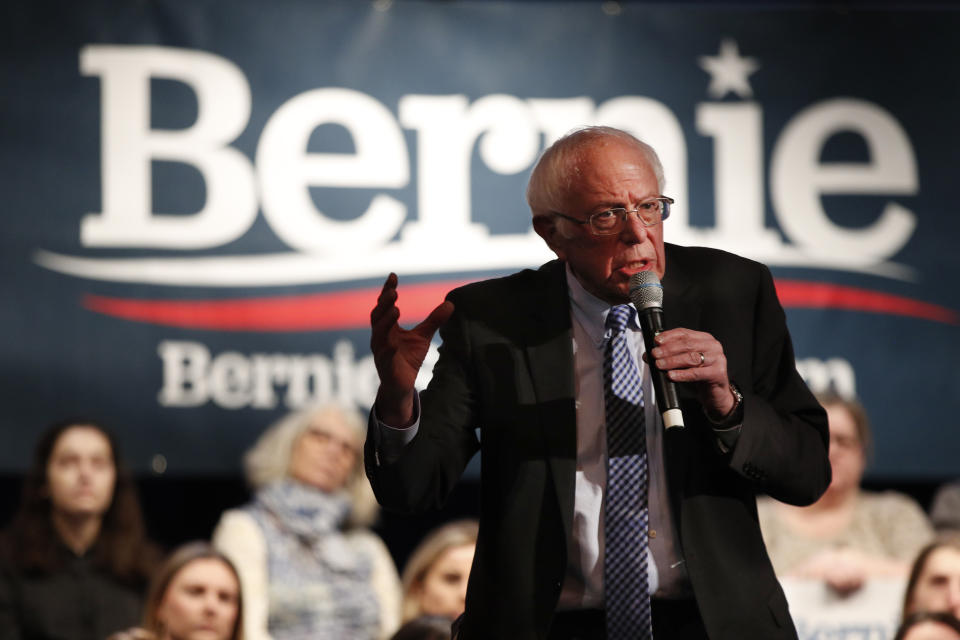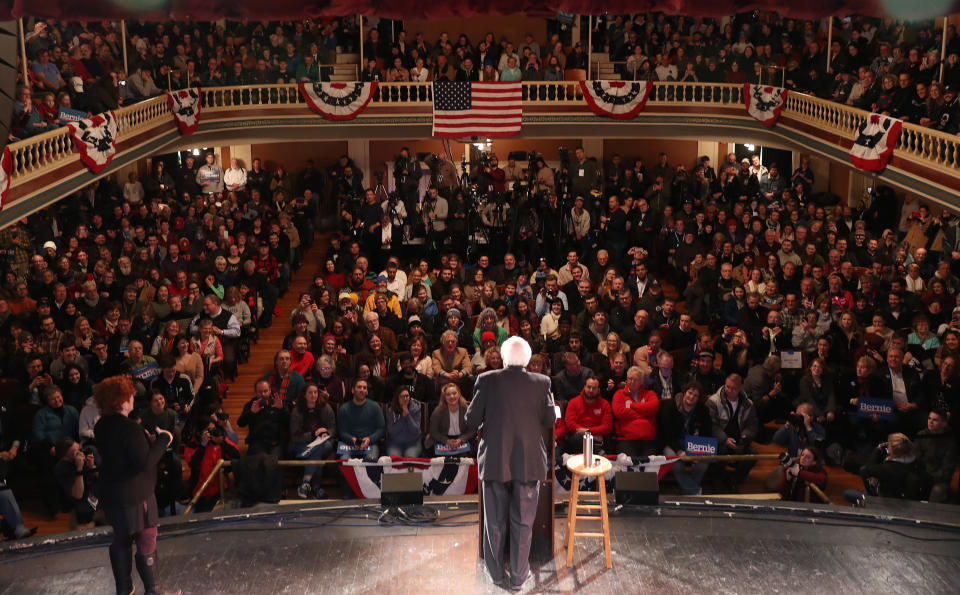Sanders campaign, sensing a win in New Hampshire, looks ahead — all the way to the convention
- Oops!Something went wrong.Please try again later.
- Oops!Something went wrong.Please try again later.
- Oops!Something went wrong.Please try again later.
ROCHESTER, N.H. — Sen. Bernie Sanders, now the de facto frontrunner in a muddled Democratic primary race, exhorted his supporters Saturday to deliver him a victory in New Hampshire and prepare for the fight beyond.
“I’m a little nervous, is this old opera house going to stay standing after this event?” said Sanders taking the stage in the 112-year-old Rochester Opera House in eastern New Hampshire. Speaking to an estimated crowd of 1,100, Sanders was in good spirits, joking that due to his packed schedule before Tuesday’s primary, his remarks would be “only two hours.”
Over 45 minutes, Sanders mostly stuck to his usual stump speech, focusing on his dream of collective international action against climate change, Medicare for All, pharmaceutical price regulation and criminal justice reform. Although the event was initially billed as a town hall, he did not take questions. Sanders thanked the canvassers going door-to-door, who a few days ago, ringing doorbells at the rate of better than one a second, surpassed their own total of voters contacted from four years ago. He also thanked New Hampshire, which gave him a 22 point margin of victory over Hillary Clinton in 2016, for legitimizing his agenda. He closed with a call reminding supporters that the effort to implement his broad progressive plans would not end with the election.
“I am asking a lot of you. Obviously, I am asking for your votes on Tuesday, but I am asking for more than that. I am asking you to work with me after our inauguration, to come back and say, ‘Yes, we are going to stand together,’” said Sanders, adding, “Two days from today will be an enormously important day. If we win here in New Hampshire, and with your help I think we can win, it will make it easier for us to win in Nevada and in South Carolina and in California. You will make it easier for us to win the Democratic nomination and then have the opportunity to soundly defeat the most dangerous president in American history.”

The senator didn’t name any of his Democratic opponents directly, although he did take two unmistakable shots at former South Bend, Ind., Mayor Pete Buttigieg, who polling shows has emerged as his chief rival here. Sanders pointedly said his campaign isn’t funded by billionaires, one day after attacking Buttigieg on the debate stage over his wealthy backers. And he claimed victory in last week’s Iowa caucuses on the basis of raw vote totals, while Buttigieg is slightly ahead in the number of delegates awarded — although the complicated and error-ridden process of tabulating votes leaves an exact outcome still in doubt. Even Michael Moore, the filmmaker and left-wing provocateur, who spoke before Sanders at the event, was mostly respectful of the rest of the Democratic field, calling it “a good group of human beings.”
Sanders has started to broaden his electability pitch. In Friday night’s debate, he emphasized his ability to work with Republicans, saying, “There were periods when I was in the House of Representatives ... where I passed more bipartisan amendments than any other member of the House. There are ways we can work with the Republicans on issues where we have a common basis.” When pressed on whether billing himself as a democratic socialist would hurt his ability to build a broad coalition capable of defeating President Trump, Sanders said, “The way you bring people together is by presenting an agenda that works for the working people of this country, not the billionaire class.”
Is Sanders the favorite? With former Vice President Joe Biden already conceding defeat in New Hampshire after a fourth-place finish in Iowa, the political prognostication site FiveThirtyEight has given Sanders a 45 percent chance of winning the nomination on the first ballot, the best of any candidate but still far from being a sure thing. (Second place is “No one” at 24 percent followed by Biden at 20 percent.) The campaign also reloaded the coffers, raising $25 million in January, more than any other Democrat had raised in any entire quarter. The campaign announced that more than $5.5 million of that will go to ad buys in the March 3 Super Tuesday states, including delegate-rich California and Texas.
For Sanders this is a remarkable comeback from where he was six months ago. His poll numbers stalled from the late summer into autumn, and then disaster seemed to strike when he was hospitalized in October with a heart attack, keeping him briefly sidelined and raising questions about whether the 78-year-old candidate would even continue with his second presidential bid. But a strong debate performance followed by perhaps the most high-profile endorsement of the primary thus far — that of Rep. Alexandria Ocasio-Cortez, the charismatic New York freshman — reenergized the campaign and started him on his upward trajectory in the polls.

The campaign has billed itself as antiestablishment from the beginning, and the Democratic establishment has taken note. On liberal-leaning MSNBC, longtime host Chris Matthews had two separate meltdowns over the last week, having been brought to the edge of tears discussing a potential Sanders victory on Monday and making a strained analogy between Sanders’s brand of European-style socialism and Leninist dictatorship as practiced by Fidel Castro in Cuba. “I believe if Castro and the Reds had won the Cold War, there would have been executions in Central Park and I might have been one of the ones getting executed,” Matthews expostulated (referring to Communism by a slang term from the last century that has more recently come to signify the Republican Party.)
Joy Ann Reid, also an MSNBC anchor, brought a body language expert on her show in January who analyzed Sanders’s posture and concluded he was lying when he denied telling Sen. Elizabeth Warren that a woman couldn’t win the presidency. “Meet the Press” host Chuck Todd hosted a panel Friday that warned Sanders against starting a class war against billionaires. This is a stark contrast from much of the 2016 primary when the mainstream media, expecting Sanders to drop out long before the convention, gave him relatively light coverage, a situation his supporters called the “Bernie Blackout.”
Hillary Clinton, who defeated Sanders for the 2016 Democratic nomination but believes he hurt her chances against Donald Trump by delaying his concession, is still bitter about the race and said of Sanders, “Nobody likes him, nobody wants to work with him.” As the former secretary of state has been making the rounds promoting a forthcoming documentary, she has attacked Sanders as incapable of uniting the party.
But when Clinton’s comments about Sanders’s unpopularity were raised on the debate stage Friday night, Biden literally hugged Sanders to show his support, while Sen. Amy Klobuchar talked about how much she liked Bernie and brought up times she had worked with him on legislation. (Klobuchar’s affection for her Senate colleague, despite their wide ideological differences, is often visible, in stark contrast to her barely disguised loathing of Buttigieg.) Tom Steyer, a member of the billionaire class that Sanders likes to demonize, seems so interested in earning Sanders’s friendship that it’s become a running joke.
Polling confirms those anecdotal observations. In a Morning Consult survey of senators’ popularity among their constituents released in January, Sanders ranked ahead of all 99 of his peers. Among Democrats nationwide, there is no evidence of his unpopularity. In a recent Economist/YouGov poll, 22 percent of Democrats said they would be disappointed if Sanders were the nominee, putting him squarely in the middle among Biden, Steyer, Buttigieg and Klobuchar. (Warren had the best number, with just 15 percent saying they’d be disappointed if she won.)
This lines up with a CNN poll in which voters were asked if they would be enthusiastic or satisfied with certain candidates winning the nomination. Those results showed Sanders just in front of the other leading candidates, with 77 percent saying they’d be enthusiastic or satisfied with Sanders versus 72 percent for both Warren and Biden. The numbers for those who said they would be dissatisfied or upset were also similar, with 23 percent for Sanders versus 24 for Warren and 26 for Biden. Sanders has also continually led in polling as the most honest candidate.
With the money and volunteers to take the race to convention, the Sanders campaign has high hopes they can take advantage of the division among moderates and lock in a victory on the first ballot, with Tuesday’s primary the next big test for the grassroots juggernaut.
_____
Read more from Yahoo News:



